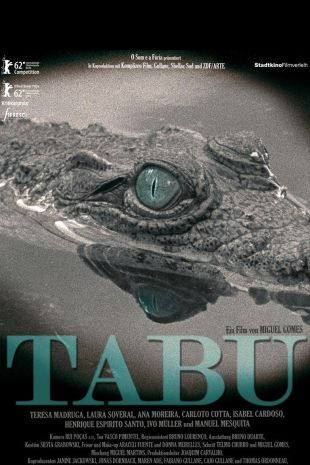Portuguese director Miguel Gomes' third feature is a captivating blend of romanticism, comedy, adventure, and tragedy that is also a loving homage to the rapturous black-and-white films of yesteryear and to the all-but-forgotten expressiveness of silent cinema. Tabu, shot entirely in black-and-white in the square 1.37:1 aspect ratio and alternating between sumptuous 35mm and grainy 16mm film stocks, begins with a somewhat bizarre prologue set in Africa in which a grief-stricken explorer jumps to his death in a crocodile-infested river after his wife dies. This bit of business, which foreshadows things to come, is revealed to be part of a movie playing in a Lisbon theater. The picture is being watched by Pilar (Teresa Madruga), a solemn, middle-aged woman who lives a mostly quiet life in a nearby apartment complex. The story that follows is divided into two distinct sections.
The first is entitled "Paradise Lost" and centers on Pilar's various explorations into social activism, her platonic relationship with a lovelorn artist who gives her paintings that she only hangs on her wall when he visits, and her growing concern for an elderly neighbor named Aurora (a terrific Laura Soveral) who is addicted to gambling and continually fritters away her inheritance at a local casino. As she tells Pilar in a brilliantly conceived monologue that includes vivid descriptions of dreams about monkeys, she can't live without knowing what will happen if she dares to risk it all, even though her gambling ventures result in continually diminishing returns. Aurora is also in poor health and appears to be in the early stages of dementia. She's cared for by her devoted maid Santa, who is paid by Aurora's estranged and never-seen daughter. As the film's first half unfolds, the story gradually shifts its focus away from Pilar and hones in on Aurora and her ever-increasing fits of anger and confusion. This emphasis, however, is both rewarding and frustrating. After spending nearly an hour with Pilar, she suddenly disappears from the movie when Aurora's former lover, Gian Luca Ventura (Henrique Espirito Santo), appears and recalls his passionate affair with the married Aurora a half century earlier in Africa near the legendary Mount Tabu. Thus begins the film's second major section, entitled "Paradise."
As Ventura starts to tell his tall tale of forbidden romance and adventure with the vibrant and strikingly beautiful Aurora (played in her youth by Ana Moreira), the film shifts from its crisp, 35mm black-and-white compositions to a more muted palate shot in 16mm. The switch in tone works well and gives the long-ago affair an ancient feel, but Gomes' other major stylistic change proves to be somewhat less effective. Once Tabu flashes back in time to 1960s Africa (it never returns to present-day Portugal and, sadly, leaves Pilar's story unfinished), it virtually becomes a silent movie. There is no spoken dialogue. No subtitles. Ventura's plaintive narration is the only voice we hear, aside from one musical interlude. The soundtrack does contain selective music and sound effects, but when the characters open their mouths nothing is heard. Gomes' decision, while affecting in some early playful scenes, grows tiresome after a while and literally robs the characters of their voices. Still, Aurora's ill-fated love affair with the impulsive Ventura, a drummer with a local band, packs a punch and leads to unexpected consequences.
Gomes' movie is a triumph of mood and style, and its bold celebration of cinema itself is a joy to behold. It's a bit too long and its overall meaning remains elusive, just like Aurora's monkey-filled dreams, but Gomes deserves applause for creating a film that is as beautiful, frustrating, painful, romantic, confusing, and exhausting as life itself.
